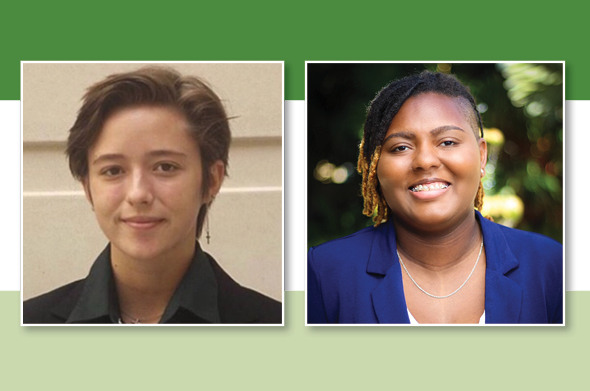Here are Stetson Law’s 2022 Racial Justice Fellows

With a sharp focus on racial justice, two Stetson Law students will spend the next year building a more equitable community through collaboration with fellow students from a range of backgrounds.
As part of the St. Petersburg Higher Education Racial Equity Consortium (SPHERE), the two will serve as Racial Justice Fellows alongside students from each of St. Petersburg’s higher-learning institutions. The fellowship program, now in its second year, consists of students from Eckerd College, St. Petersburg College, Stetson University College of Law, and University of South Florida St. Petersburg. Through an application process, consortium organizers selected two students from each institution.
The aim is to bring participants face to face with community leaders, faculty, and mentors to collaborate on projects that will help create progress within St. Petersburg through influencing public policy and challenging the status quo.
“Working with leaders in the community and the SPHERE consortium, this class of Racial Justice Fellows will build on the work of the first cohort and help to establish real change through projects focused on shaping policy and transforming systems to create more equitable outcomes for all,” said Michelle Madden, campus diversity officer at USF’s St. Petersburg campus.
Meet Stetson Law’s two student fellows
Though their backgrounds differ, the students selected share a deep passion for advocating for the underserved – and the hope of applying skills and tools they are gaining through their legal education to do so.
For Stetson Law student Zenea Johnson, who is pursuing a J.D. with a social justice advocacy concentration, the fellowship is her next step in understanding the many fights taking place within the space of social justice. It would build on lessons from a career she has so far spent dedicated to helping women from underrepresented populations, from domestic abuse survivors to refugees in the process of resettling in the U.S. She said her own experience as a woman from an underrepresented group has inspired her to keep going.
“After years of experiencing life through the lenses of the many intersections of my identity, there is one lens that will always have a greater impact on how I see society and that just so happens to be the one part of my identity that society sees first,” Johnson said.
Law student Jessica King, who earned her B.A. in sociology with minors in history and leadership studies, said she came to law school with a dream of using her law degree in the service of progressing racial equality in the South. She believes the fellowship can help give her the mentorship and direction she needs amid the rigors of her studies. The program is a win-win, she added, given how she gets to help others while connecting to people, places, and opportunities she may not have otherwise known.
“I believe this fellowship will greatly shape my leadership journey and career because I came into law school with a dream to use my law degree to work and progress racial equality in the South and I believe this fellowship would give me the direction and mentorship I need,” King said.
What the fellowship entails
As with the inaugural 2021 edition of the program, the Racial Justice fellows will participate in regular meetings on how to build on the previous cohort’s strategic vision for what’s known as a Truth, Racial Healing and Transformation Center for Pinellas County.
Each student will receive a stipend of up to $2,000 for the 2022-2023 academic year and will work as interns in summer of 2023. Last year’s participants interned at organizations like the NAACP, the City of St. Petersburg, the Youth Farm, and Community Tampa Bay.
The students will also serve as interns in the summer of 2023 and will meet regularly for meaningful discussions surrounding diversity, equity, and inclusion. One such discussion that took place last year revolved around the idea of a “new normal” and how the struggles of 2020 have made campus life for underrepresented students even more difficult than before.
Faculty mentors see the program as a building block for meaningful careers current participants will spend advocating for those who need it most.
“We hope that SPHERE’s one-year fellowship and summer community internships will introduce our students to a lifetime commitment of addressing racial injustices,” said Stetson Law Professor Judith Scully, director of Stetson Law’s Social Justice Advocacy program. “Our curriculum is merely a foundation for our students to stand upon as they begin to see themselves as courageous leaders with a focus on racial equity.”
Post date: Sept. 13, 2022
Media contact: Kate Bradshaw
[email protected] | 727-430-1580